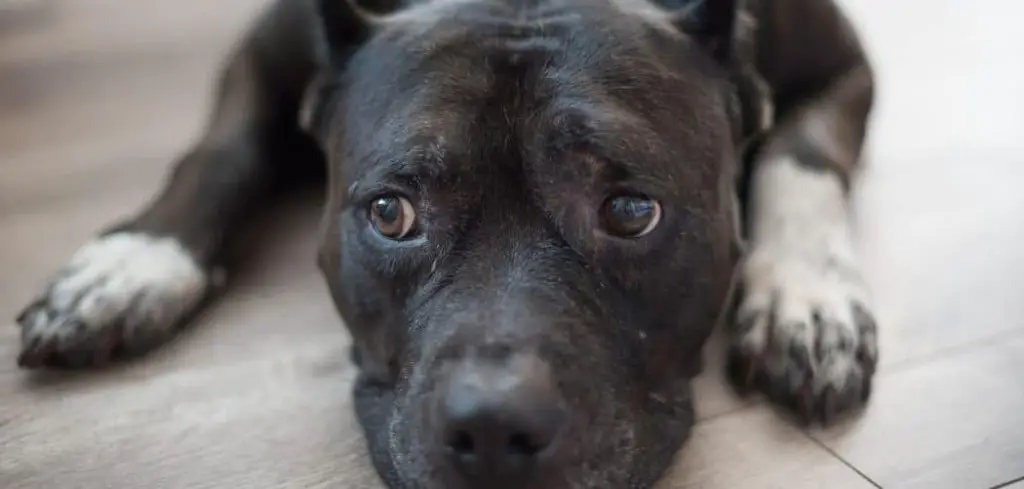Noticing mucus in a dog’s stool can be alarming, even more so when it happens suddenly.
When diarrhea with mucus appears without any other obvious symptoms, it may indicate a range of underlying issues from mild irritation to early stages of illness.
We outline the common causes of dog diarrhea with mucus with no other symptoms, what you can do at home, and when to seek veterinary help.
Table of Contents
Dog Diarrhea Mucus No Other Symptoms — Why It Happens
When a dog has diarrhea with mucus but no other symptoms, it is often linked to irritation or inflammation in the intestines. Causes may include dietary changes, stress, intestinal parasites, bacterial infections, food intolerances, or colitis. Even if the dog appears otherwise healthy, the mucus is a sign that the digestive tract is reacting to something.

Dog Diarrhea Mucus No Other Symptoms: Possible Causes
Dietary Indiscretion
Dogs are curious by nature, and eating something outside their normal diet—such as table scraps, garbage, or spoiled food—can irritate the intestines. This irritation often shows up as diarrhea coated in mucus.
Even if no vomiting or lethargy is present, the stool changes signal that the digestive system is inflamed. In many cases, the problem resolves with time, but repeated episodes should not be ignored.
Read more: Dog Vomiting No Other Symptoms (Here’s what it means)
Sudden Food Changes
A quick switch from one dog food to another can upset the balance of bacteria in the gut. This disruption often causes loose stools with mucus but no other visible symptoms.
If the only change has been diet-related, the issue may improve once the dog’s system adjusts. However, repeated diarrhea suggests that a slower transition or different food may be needed.
Intestinal Parasites
Even when a dog shows no other signs of illness, parasites like Giardia or whipworms can cause mucus in the stool. The parasites irritate the lining of the intestines, leading to inflammation and excess mucus production.
Because the dog otherwise seems normal, owners may not realize parasites are the issue until diarrhea persists. Veterinary testing is often required for an accurate diagnosis.
Stress and Anxiety
Just like humans, dogs can develop digestive upset when stressed. Changes in routine, travel, new pets in the household, or separation anxiety may trigger mucus-filled diarrhea without additional symptoms.
These episodes can come and go depending on the stress level. While not always serious, chronic stress-related diarrhea should be addressed with both behavioral support and veterinary guidance.
Food Intolerance or Sensitivity
Some dogs develop sensitivities to certain proteins, grains, or additives in their diet. This can cause recurring diarrhea with mucus as the digestive tract reacts to the trigger ingredient.
Since the dog may otherwise seem fine, food intolerance can be difficult to identify. Keeping a food diary and working with a vet can help pinpoint and manage the issue.
Colitis
Colitis is inflammation of the large intestine and is a common cause of diarrhea with mucus. It may appear suddenly and resolve quickly, or it can be a chronic problem that requires ongoing care.
Dogs with colitis often strain during bowel movements, and the stool may appear slimy or streaked with clear or whitish mucus. Even without other symptoms, colitis can be uncomfortable and should be treated appropriately.
What to Do If Your Dog Has Diarrhea With Mucus But No Other Symptoms
If your dog has a single episode of diarrhea with mucus but seems otherwise fine, monitoring may be all that is needed. Providing access to fresh water is essential to prevent dehydration, as even mild diarrhea can cause fluid loss.
Offering a bland diet of boiled chicken and rice for a day or two can help calm the digestive system. Avoid giving treats, table scraps, or sudden food changes during this time.
Reducing stress, maintaining a consistent feeding routine, and allowing the gut to rest can often help resolve the issue. If the problem persists for more than a couple of days, veterinary guidance is recommended.
When to Call or Visit Your Vet
If diarrhea with mucus lasts longer than 48 hours, even with no other symptoms, it’s important to call your veterinarian. Persistent changes in stool can point to infections, parasites, or chronic digestive problems that require treatment.
Immediate veterinary attention is needed if diarrhea is accompanied by blood, lethargy, vomiting, loss of appetite, or rapid weight loss. Puppies, senior dogs, and dogs with preexisting health conditions are especially vulnerable to complications from diarrhea and should be evaluated quickly.
Even if your dog seems normal otherwise, mucus in stool is a sign of intestinal irritation and should not be ignored if it continues.
Read more: Dog Diarrhea and Not Eating (What it could mean)
Key Takeaway
When a dog has diarrhea with mucus but no other symptoms, it can be caused by something as simple as a food change or stress, or as complex as parasites or colitis. While a single episode may not be urgent, repeated or prolonged diarrhea always deserves attention.
Caring for your dog with hydration, a bland diet, and stress reduction can help in mild cases, but persistent symptoms should be evaluated by a veterinarian. Acting early ensures your dog’s health and comfort are protected.
